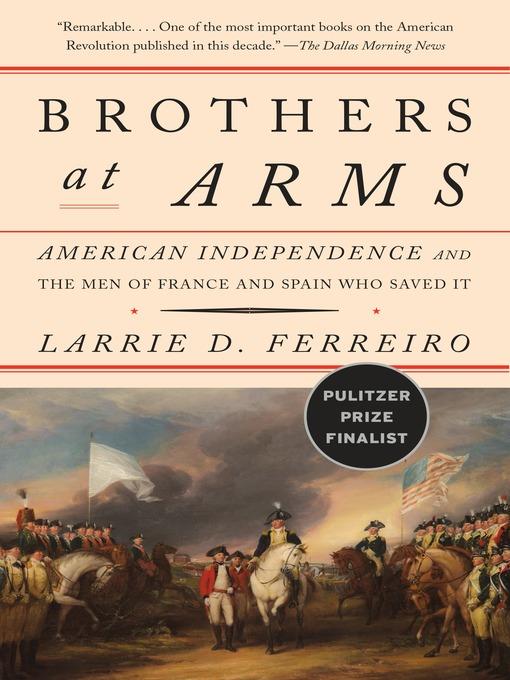
Brothers at Arms
American Independence and the Men of France and Spain Who Saved It
کتاب های مرتبط
- اطلاعات
- نقد و بررسی
- دیدگاه کاربران
نقد و بررسی

European allies supplied arms, ammunition, uniforms, savvy commanders, engineers, and soldiers to aid the American Revolution.The newly proclaimed United States was not the only nation that wanted Great Britain out of North America in 1776. After being defeated by Britain in the Seven Years' War, France and Spain were eager to show their strength against their adversary. Ferreiro (History and Engineering/George Mason Univ., Stevens Institute of Technology; Measure of the Earth: The Enlightenment Expedition that Reshaped Our World, 2011) mounts a deeply informed, authoritative, and compelling argument for the importance of two major European powers to American independence. "Instead of the myth of heroic self-sufficiency," he writes, "the real story is that the American nation was born as the centerpiece of an international coalition." At the time, America's militia was "ill-equipped" and undisciplined. In July 1775, George Washington became commander in chief with no military training and quickly crammed by studying translations of European military books. When he needed engineers and artillerists, he looked to France, which reputedly had the best. He came to rely most on Louis Lebegue Duportail, an engineer whom he promoted to major general. It was Duportail who persuaded Washington to set up a camp at Valley Forge, strategically located 20 miles from British forces in Philadelphia. The encampment, speedily built by soldiers, with more than 1,000 huts, "became America's fourth-largest city" within six weeks. Besides offering a vivid chronicle of combat, the author traces the tense negotiations between American emissaries in Europe--notably Benjamin Franklin and Silas Deane--and their French and Spanish counterparts. Other nations were involved, too: Dutch merchants were part of a long supply chain providing arms and "some of the finest gunpowder in the world"; the Prussian Baron von Steuben carried out relentless drills to professionalize the continental soldiers. But as Ferreiro shows, French aid was foremost: Franklin did not exaggerate when he called France's King Louis XVI America's "friend and father." A largely untold, engrossing history of our nation's fraught, and unlikely, path to liberty. COPYRIGHT(1) Kirkus Reviews, ALL RIGHTS RESERVED.

Starred review from September 15, 2016
Ferreiro (history, George Mason Univ.; Measure of the Earth) presents the American Revolution in a global context, detailing the many Europeans who played critical roles in American Independence, delving into the histories of the players whose decisive actions gave George Washington the men, material, and ships necessary to wrestle the colonies from Britain. Readers will discover important figures such as French minister Charles Gravier, Comte de Vergennes, and admiral Charles Hector, Comte d'Estaing, as well as Spanish commander Bernardo de Galvez. Ferreiro also discusses the intricate Atlantic supply chains that fed the U.S. army, as well as critical naval technology and tactics like copper plating. The text describes the motivations of numerous French and Spanish ministers, traders, sailors, and soldiers, unveiling many underappreciated actions, including the Spanish seizure of British Pensacola, the chess match in the Caribbean islands, and the cat-and-mouse game between the French and British fleets. VERDICT This work is scholarly and heavily researched, a denser read than David McCullough's 1776, providing much information from an often neglected perspective. Even seasoned American history readers will likely find new content on a pivotal era.--Jeffrey Meyer, Mt. Pleasant P.L., IA
Copyright 2016 Library Journal, LLC Used with permission.

November 15, 2016
Historian Ferreiro examines the assistance provided by France and Spain during the American War of Independence and weighs its effects on campaigns and battles. Their aid was hardly motivated by the lofty principles of the Declaration of Independence; it emanated, as Ferreiro shows, from France and Spain's desire to avenge their defeats by Britain 15 years previously in the Seven Years' War. After describing the political calculations of the royal courts in Paris and Madrid, Ferreiro provides shipment-to-shipment detail of arms, money, and men that flowed across the Atlantic Ocean at first surreptitiously, then overtly with the Franco-American alliance of 1778. A mark of Ferreiro's thorough research, this information becomes enlivened with his recounting of numerous European military officers who received commissions in the Continental Army. Many more than the few later memorialized in place namesDeKalb, Lafayette, Pulaskithis cadre provided the Americans with important expertise in fortifications and artillery. But it was the French navy, argues Ferreiro, that proved crucial to victory. Important as scholarship, Ferreiro's history is also eminently fluid for all readers interested in the U.S.' beginnings.(Reprinted with permission of Booklist, copyright 2016, American Library Association.)

























دیدگاه کاربران